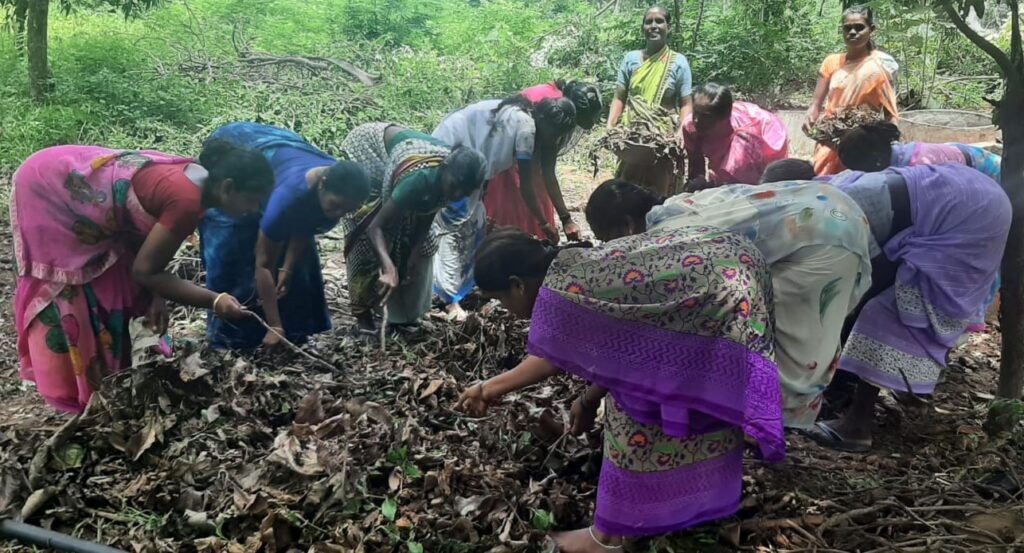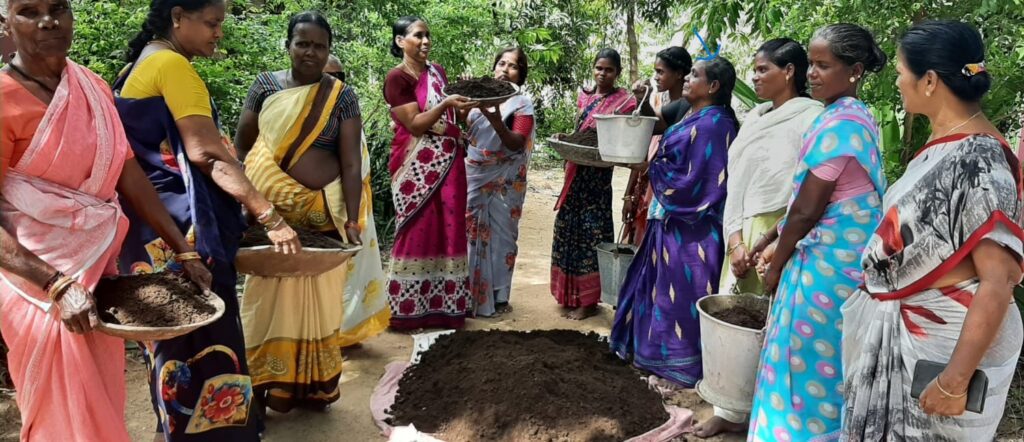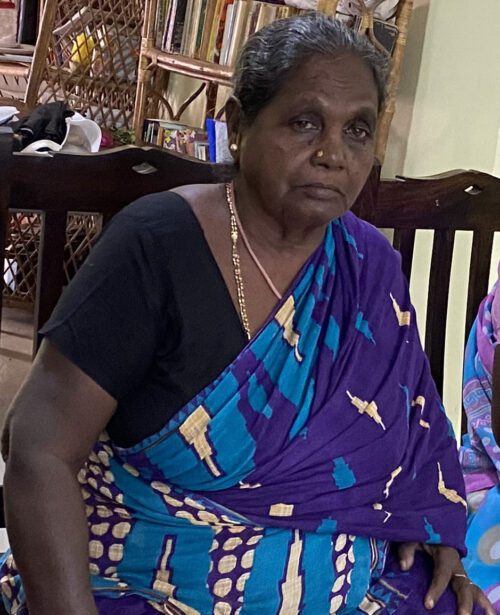(Amirthammal’s story is part of a series of case studies on exceptional women farmers practicing agroecology. This profile is adapted from Stewards of the Fields: Women Farmers Navigating Sustainable Paths: A series of case studies of fifteen women farmers’ experiments with agroecological farming published by MAHILA KISAN ADHIKAAR MANCH.)
Amirthammal is a 65-year-old Dalit (Christian) woman farmer from Siranamallai, Tamil Nadu. A member of Tamil Nadu Women’s Forum and trained by Society for Rural Education and Development (SRED, she started farming at a young age, influenced by her parents, who were farmers and who played a significant role in her learning, imparting knowledge about crop selection, seed preservation, natural compost preparation, and pest control. While she says she had no choice but to pursue agriculture, she took it seriously and supplemented the knowledge she learned from them with training programs. She has been practicing agroecological farming for several years now. Apart from farming and backyard poultry, she also engages in daily wage labor. Her household consists of 5 members, including herself, and she is the sole breadwinner of her family.
Amirthammal embarked on a remarkable journey of self-discovery and learning through practical experiments on her two-acre farm. Her farming activities encompass land preparation, sowing, weeding, and harvesting, focusing on sustainable practices such as bio-pesticide use and composting, particularly in her paddy cultivation.
Soil building and composting
Amirthammal’s initial foray into organic farming initially resulted in poor yields, leading to disappointment and self-reflection. However, Amirthammal’s resilience prevailed as she sought guidance from her peers and identified her mistakes. She and her fellow women farmers actively engaged in composting and soil-building, utilizing two methods: vermicompost and compost pits using dry leaves, waste, and animal dung.

Her initial attempt at vermicompost production was not without its share of setbacks, such as facing challenges in multiplying earthworms effectively. She sought advice from experienced individuals, learning the nuances of the process, she became successful in the practice. Today, not only does she use vermicompost on her farm, but she also sells the surplus, which led to a growing demand for it so that she now plans to scale up her vermicompost production.
Diversified farming
Amirthammal and her peers diversified their farming practices by cultivating soil and climate-resilient millets and vegetables. This approach has helped them reduce their dependence on external inputs. Combining small ruminants and livestock like cows, buffaloes, and bullocks with farming practices has enhanced soil fertility through manure utilization. She initiated a kitchen garden, providing her family with fresh vegetables and greens while fostering community sharing and exchange. She moved away from purchasing expensive market seeds to preserving organic seeds, promoting seed exchange among fellow women farmers. She and the other women farmers manage pest issues by creating natural pest controls using Panchakavya (a mixture of milk products and waste), while others employ locally available leaves and herbal plants.

Challenges of a woman farmer
Unpaid care work is a challenge for Amirthammal. She dedicates several hours daily to various unpaid activities, including cooking, cleaning, washing, childcare, and care for the aged and sick. She also spends time fetching water and fuel wood and getting adequate sleep and rest. Compared to Amirthammal, the men in her household contribute half an hour daily to these activities.
Despite being aware of the various markets at the rural/local level, she faced challenges accessing urban retailers, online selling platforms, FPOs, certification and labeling, storage, and transportation. These challenges emerged mainly due to a lack of information and technical knowledge.
Nonetheless she is able to sell her produce at the Kancheepuram mandi primarily because of the reasonable prices, but noted that there is no significant difference in selling prices for agroecological produce compared to chemical-based crops. Amirthammal’s produce was not certified as organic, and she did not attempt to acquire certification. She interacted with agents and middlemen and successfully bargained for better prices.
She requires an annual/seasonal credit of Rs. 15,000 for her farming needs but has not received government investments or subsidies for her farm. She took out a loan, which she is able to repay from sales of her produce. She does not have any outstanding debt or mortgage on her land/jewelry.
Conclusion
Amirthammal’s story highlights the transformative power of practical experimentation, continuous learning, and community collaboration in achieving agricultural success. Despite facing challenges in accessing entitlements, credit, and markets, her dedication to soil building, organic farming, and diversified practices sustains her family and contributes surplus to the market. Notable improvements characterized Amirthammal’s experience with agroecological practices compared to previous years, such as increased biomass, improved soil health, and higher production. Her cultivated paddy on her two-acre farm yielded 6,000 kg, 400 kg of which was used for home consumption. Five thousand five hundred kg was sold in the market, while 50 kg were contributed to a seed bank. The positive changes have been consistent since she began incorporating agro-ecological principles, leading to a gradual transformation of her farming practices.


